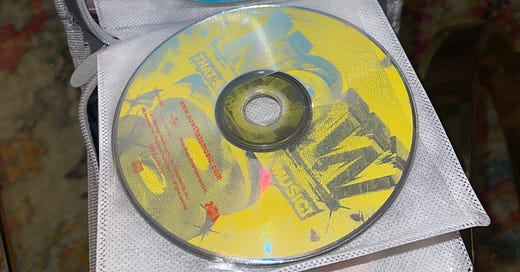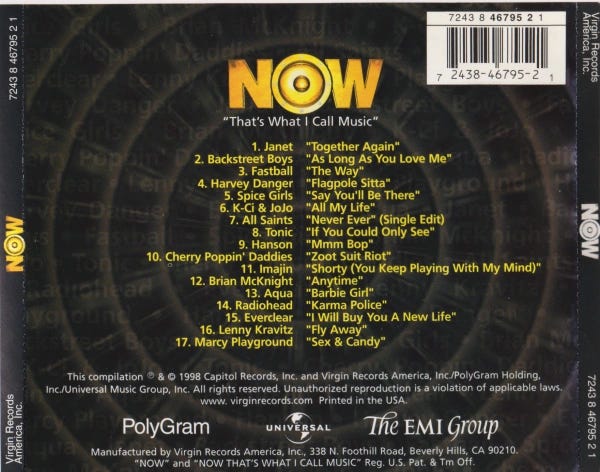The agony and the irony, they're killing me: An Ode to Flagpole Sitta
with a brief exploration of the phenomenon that was NOW That's What I Call Music!
I was a mere six years old when NOW That’s What I Call Music! Vol. 1 was released in 1998. I credit this album for making me both a music lover and a lover of pop culture. NOW was my glimpse into the adult world, filled with songs with words I was not allowed to say. Although I’m sure someone in my family purchased me this album, listening to it felt like an act of rebellion.
The snap of the plastic cassette case opening was like a portal, transporting me from my suburban bedroom to a pulsating dance floor. Neon lights flickered behind my eyes as Britney Spears’ breathy vocals wrapped around me. I collected the cassettes and CDs like baseball cards.
If you were born post-2005, you might not be familiar with the cultural phenomenon that was the NOW series. Allow me to explain briefly.
NOW That's What I Call Music (or simply NOW) is a series of compilation albums by various artists, which originally began in the UK in the 80s. The albums feature popular songs across genres, from pop to rap to country and indie. Think of them as a mixtape or a musical time capsule. And if you think NOW no longer exists (like I did) you’d be wrong, as they are now on Volume 88.
I will never part with these bad boys.
Back in my day, we would drool over the latest NOW commercial, savoring those five-second clips of a song featured on that album. We would eagerly wait for a trip to Sam Goody or FYE when a new CD dropped. NOW was the zeitgeist. I hate using this phrase, but you really had to be there.
The first NOW album included absolute bangers such as:
As Long as You Love Me by the Backstreet Boys
Together Again by Janet Jackson
All My Life by K-Ci and JoJo
Say You’ll Be There by the Spice Girls
Barbie Girl by Aqua
It also included the scandalously titled Sex and Candy by Marcy Playground, which I never listened to until years later because I was a good Catholic girl!
I would be in my room for hours with my boombox, playing the same songs over and over again, digesting and dissecting every lyric, beat drop, and melody. I assume my parents didn’t carefully examine the contents of the cassette tape* because there’s no chance I would have been allowed to listen to a handful of those songs.
*Side note: Have you seen the TikTok of kids trying to figure out how to get a CD out of its case? I’m not poking fun at them (entirely); I simply felt like a fossil seeing that. Anyways.
Of that first NOW album, one song in particular stuck out to me then and still does - Flagpole Sitta by Harvey Danger.
We’re all familiar with the angsty, rebellious track, which seems to live now on your local adult-easy-listening radio station. Even though I had no idea what this song meant as a kid, I couldn’t get enough of it. As an adult, however, I understand it all too well. So, let’s get into the song’s background.
Quelle surprise - Harvey Danger is not a singer's name as I thought it was. But it’s the name of the band, which consisted of lead singer Sean Nelson, drummer Evan Sult, bass guitarist Aaron Huffman, and guitarist Jeff Lin. Jeff and Aaron were student journalists together at the University of Washington’s student newspaper and took the name "Harvey Danger" from a phrase graffitied on the office's wall.
As for the song’s title - “Flagpole Sitta” - it had always perplexed me. It begged the question: “What, or who is a flagpole sitta?”
For far too long, I thought “sitta” was a form of writing, perhaps something similar to a sonnet or a ballad. However, according to my hours (read: seconds) of research, the title refers to the 1920s trend of Flagpole Sitting, where people would climb up flagpoles for fun (kooky!). The band was also inspired to spell "sitter" as "sitta" by N.W.A’s Straight Outta Compton. Fun facts abound!
The song touches on the subjects of non-conformity, media manipulation, paranoia, and rebellion. Sean Nelson’s voice is simply too perfect for this song. It’s not so much about how his vocals sound but how he delivers the lyrics. Angry, direct, and powerful, but softened at just the right moments.
The lyrics scandalized and disturbed me. I actually think it’s my first recollection of being disturbed by something (the first of many). Specifically, these lines:
Put me in the hospital for nerves, and then they had to commit me
You told them all I was crazy
They cut off my legs; now I'm an amputee; God damn you
My favorite section of lyrics, however, is:
I wanna publish 'zines, and rage against machines
I wanna pierce my tongue
It doesn't hurt, it feels fine
The trivial sublime
I'd like to turn off time
And kill my mind
I interpret this as wanting to do so much in life and wanting to make a change but also feeling apathetic to absolutely everything. Everything matters, and yet nothing does. And everyone is boring.
But perhaps the most famous of the lyrics are those that introduce the chorus:
I’m not sick, but I’m not well.
These seven words encapsulate the theme of the song perfectly. Our protagonist proclaims that while he might be physically ok, he is mentally unwell. He’s trying to maintain his sanity while living in a crazy world. I’m sure we’ve all had similar feelings, haven't we?
There is something very ironic about a song that’s about anti-conformity becoming a staple song of the 90s. Our singer sits upon the flagpole, an observer of society but not an active participant. And yet, with this song becoming a massive hit, it became part of society.
The band has since broken up, but the message and lyrics still live on. And a song like this feels more important than ever before. I think I’ll listen to the rest of Harvey Danger’s discography tonight.






